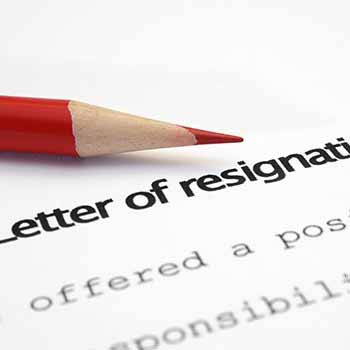Doing a great job when you start a new role is expected. Doing a great job when you leave cements your professional reputation.
The way you resign from a job can have a lasting impact on your future career, so it’s important to know how to quit your job without damaging your professional reputation. With recruitment services in China, Robert Half can offer you expert tips on how to resign in a professional manner.
How to resign in style
The business world can be surprisingly small, so even if your time with a particular employer hasn’t been completely positive, it’s critical to take a professional approach to resigning. This not only ensures the door is left open if you ever want to return to your current employer, it can also increase the likelihood of receiving a glowing reference.
Send us your resume
Our staffing specialists will review your resume and contact you if we find a position that matches your qualifications.
Be discrete about attending job interviews
Keep plans of resigning to yourself, especially if you plan to secure a new job before leaving your current employer. Attending job interviews while you’re in a role can be a juggling act, but discretion is essential. Communicate with hiring managers in your own time, on your own devices and use your private email address. If you can’t avoid attending interviews during business hours, aim to make appointments during lunch hours.
Know how much notice you need to give
Even if you don’t have a new role lined up before you resign, look into how much notice you’re required to give as this can shape the start date for your next job. The website of the Fair Work Ombudsman is helpful here.
Serving out the required notice period will also let your employer find a suitable replacement. If there is no agreement in place, two weeks is considered standard, but giving more than this would be a graceful parting gift to your current employer. In practice, finding your ideal replacement in just two weeks is likely to be extremely challenging.
Have your resignation letter ready
When the time arrives to move on, be prepared to hand your notice in writing – and in person.
Draft your resignation letter, but don’t print it out or send it just yet. First, book a meeting with your manager.
In the meantime, keep news of your impending resignation to yourself. As a professional courtesy, your manager should be the first person to know.
How to write a resignation letter
Not sure what to say in a resignation letter? Use our resignation letter examples to get the tone and wording right, and finish with your current employer on a positive note.
How to quit your job without burning bridges
Chances are you feel uncomfortable about breaking the news of your resignation to your employer. While that’s understandable, face-to-face discussions are the most powerful of workplace encounters, and giving your boss the respect of an in-person resignation is a professional way to manage the beginning of your exit.
During the meeting, explain why you are leaving. Be sure to remain positive – taking a negative approach can jeopardise your ability to leave on good terms. Instead, be courteous and highlight the positive experiences you have enjoyed during your time at the company and express your appreciation for the professional opportunities you’ve enjoyed including any company-paid training that has helped to develop your skills and experience. Taking the time to thank your manager will help you leave on good terms.
Be diplomatic
When you’re thinking about how to resign, consider why you’re leaving your job – you may be looking to develop new skills, enjoy flexible hours, or opportunities to learn in different environments. Or, you may be hoping for a salary uptick.
Whatever the case, give your reasons for leaving without giving offense. If you feel strongly about providing feedback on any negative experiences, think through any comments you plan to make prior to the discussion, and don't put them in writing. Use the meeting with your manager to voice the issues but don’t let them become the focal point of the conversation.
Close the meeting by discussing next steps including the notice period you are expected to serve and your leaving date. Let your employer know that you will send a follow-up email to confirm what has been discussed. Once the meeting is over, edit your resignation letter to include the key points noted in the meeting, and forward it to your employer.
Prepare for a counteroffer
Your employer may be keen to keep you on, and it pays to be prepared for a counteroffer, which may involve a higher salary, improved conditions or an expanded role. While a counteroffer can be flattering, it is important to consider the situation as a whole. You need to think about your long-term career development, and how you will best pursue your long-term professional goals.
Counteroffers can be tempting, but the risks outweigh the rewards. Leave on good terms. Be honest and explain to your employer that while you loved your job, you really want a change and despite the potential opportunities of staying on, you’re even more excited about moving on.
While not recommended, if you do consider staying, have a figure or condition in mind that would entice you to stay for the long term. Avoid settling for second best as this could see you looking elsewhere again in just a few months.
Maintain high professional standards
Once you have provided your resignation and it's all out in the open, it can be tempting to coast along until your last day. However, it pays to resist this urge. Remember, your last days will shape the final impressions you leave with your ex-employer, and it would be a shame to tarnish an otherwise stellar reputation on the basis of a few lazy last weeks.
If a replacement for your role has been found, manage the transition with professionalism and give every reason for the newcomer to think he/she has big shoes to fill. Help your replacement hit the ground running by creating a detailed transition plan and handover document including important contacts and their details. The more helpful you are, the more likely it is your employer will provide a positive reference for you.
Handling an exit interview
The resignation process may involve navigating an exit interview. Many companies conduct exit interviews to better understand employees' reasons for leaving. You’re not obliged to answer the questions but your feedback could help the overall success of the company and improve staff retention rates.
Tie up loose ends
Before you leave, check with your HR department or hiring manager to understand any entitlements you may be eligible for when you leave. You could have unused leave that should be paid out in your final pay packet.
If any of the digital devices you use at work contain personal data, be sure to back up or delete these files. Many companies will wipe the memory of desktop, laptop or tablet once an employee has left the business.
Your last days
Compose a positive goodbye note, thanking key members of your team and include the best way for people to stay connected with you. If necessary, put a smile on your face and work through those last days knowing that everything you dislike about the job will soon be out of your life and you’re on track for a new, exciting role. Skip the urge to vent on social media. Maintaining positive relationships with companies and people can help your career if you cross paths again in the future.
Keeping the entire process – from resignation letter through to your final day, as professional and upbeat as possible will keep your personal brand stay in great shape and further support your career aspirations.
How to write a farewell email
Regardless of why you’re leaving a job it’s important to know how to send a farewell email professionally so that your reputation remains in great shape.

